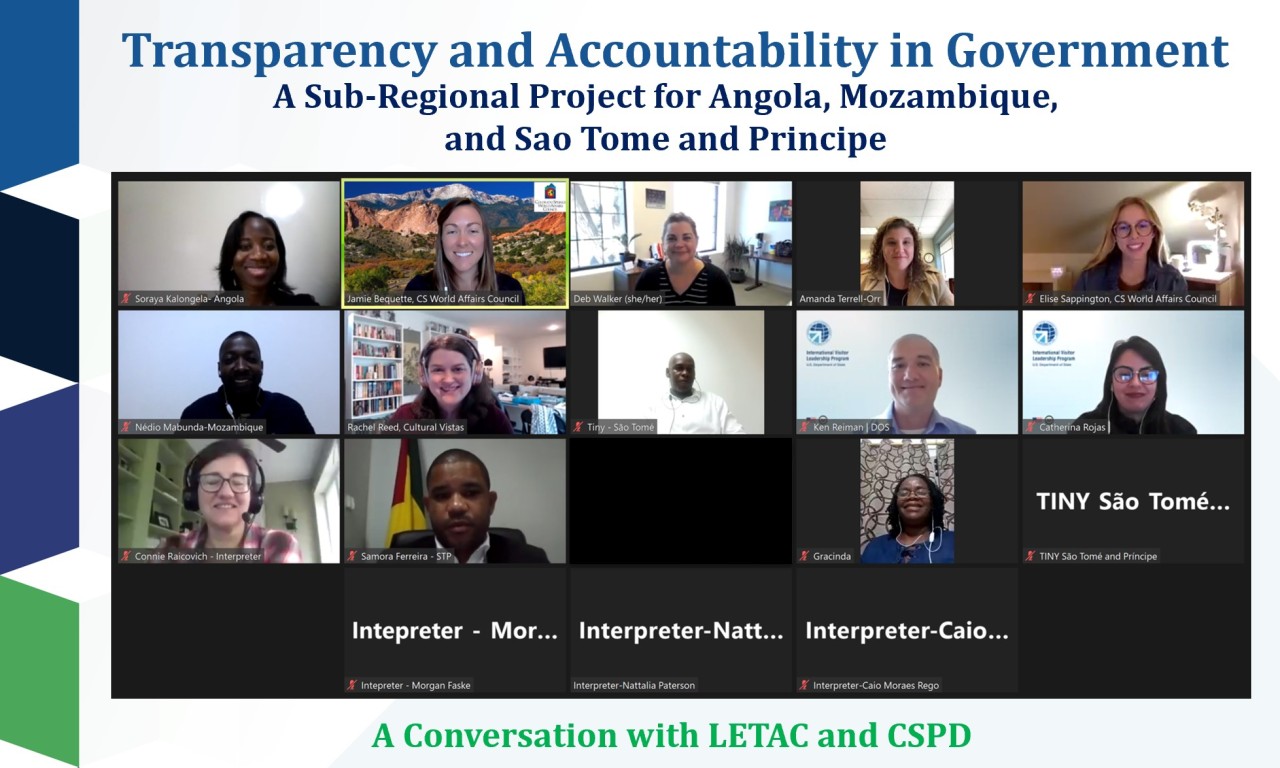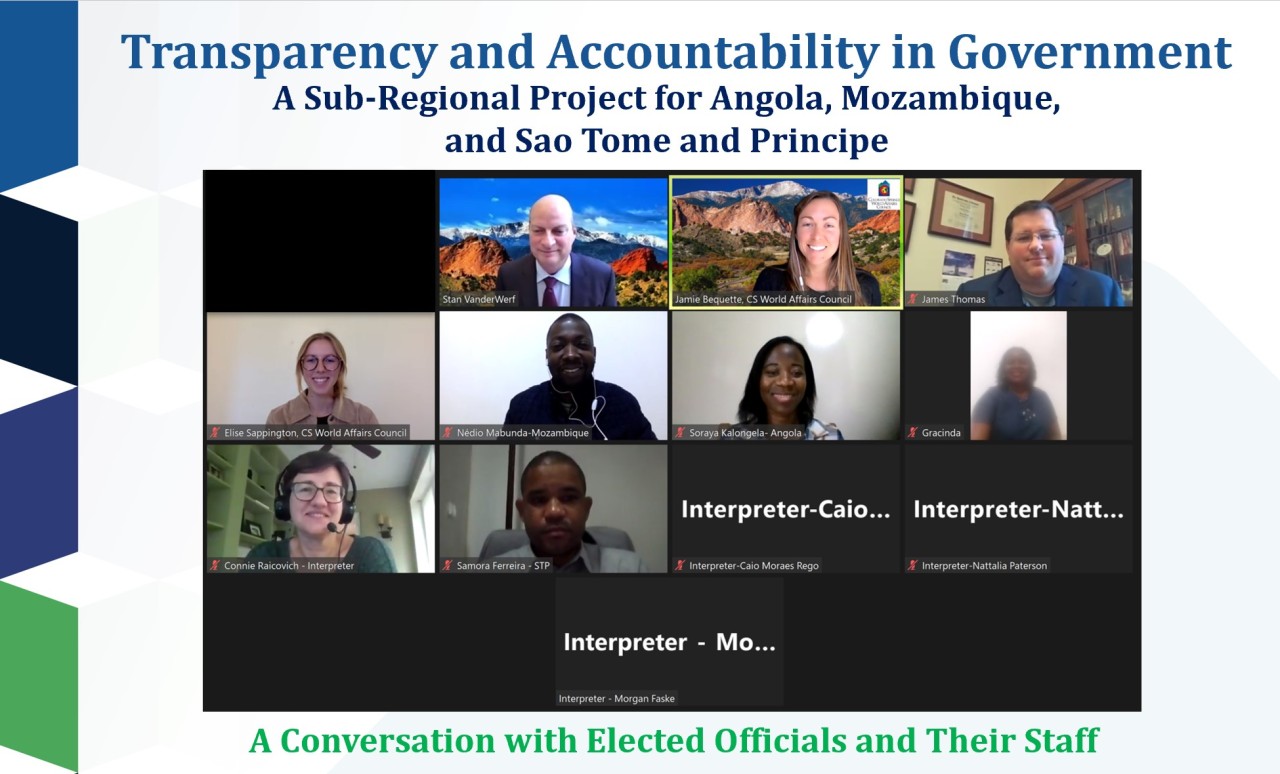What Takes Place During an IVLP Exchange? - from the eyes of Intern, Elise Sappington
Transparency and Accountability in Government - Angola, Mozambique, and Sao Tome and Principe
Our cultural moment holds the tension and weight of transparency and accountability in governing bodies. We have heard the cries and felt the quakes of our nation over injustices in our governmental systems. This project highlighted the work being done on U.S. soil to promote transparency and accountability.
In October, the Colorado Springs World Affairs Council International Visitor Leadership Program virtually hosted a delegation of public servant professionals from Angola, Mozambique, and Sao Tome and Principe. The meeting themes were centered around the topic of Transparency and Accountability in Government.
On an intergovernmental panel, El Paso County Commissioners Chairman Stan Vanderworf and Colorado Congressman Doug Lamborn's Deputy Chief of Staff James Thomas spoke on the role and examples of ethics in U.S. local and federal government.
To Vanderworf, "ethics is the bedrock of what makes government successful." He expressed the importance of always telling the truth even in light of a mistake and listening when there is a compliment or criticism to be heard. He also encouraged openness between governing bodies and constituents. He highlighted the 50+ citizen boards that ensure citizens' voices are being heard by the county.
"I think these exchanges are interesting and worth [the delegation's] time," Vanderworf said. "As an elected official, I care deeply about good public governance, and exchanging ideas on how local governments ensure accountability and transparency will allow the spread of good practices."
Thomas stands by the principle that "public officials should come in wanting to serve the public, not-self." He spoke about the governing bodies that hold Congress accountable to be ethical and transparent. Congress undergoes annual ethics training and reports to the Committee on Ethics that has supine authority to investigate and potentially criminally prosecute. He also touched on how the Congress, Senate, and House hearings and legislative discussions are transcribed and published for public scrutiny.
Tomas admitted that "congress does not always do it right." He explained that, due to the irregular legislative hours and the swiftness of the congressional process, it could always be more transparent.
This same delegation also got the opportunity to speak with representatives from the Colorado Springs Police Department and newly formed Law Enforcement Transparency and Accountability Commission (LETAC) to see a grassroots example of a commission formed out of public outcry for accountability.
Research and Development Administrator for CSPD, Amanda Terrell-Orr, addressed the delegation on behalf of police accountability measures and relationship with LETAC. Terrell-Orr explained that the conversation allowed her to think beyond just the U.S. government and more broadly and openly about policing globally.
"It allowed me to think about things differently," Terrell-Orr said. "I also was really interested in hearing what members of the delegation had to say about how [LETAC] information may work where they live and work. And hearing their questions and really understanding from their perspective what parts of what we discussed could be valuable to them to implement."
She expressed her gratitude for one delegate from Mozambique who, during the discussion, made the point of the importance of highlighting "what police is doing well" and the areas of improvement, rather than solely criticism.
"I think it was really valuable for me to have that experience and to be able to represent CSPD and the good efforts that we have made in our community," Terrell-Orr said.
Deb Walker, a commissioner on LETAC, spoke with the delegates about her role and the triumphs and challenges of implementing the commission.
"I am a champion of ensuring that community voices are heard," Walker said. "That those community voices who have been harmed by police are even preferred and make sure that the community understands how they can engage and advocate for themselves. That's why this commission is so important. Because so many of the frustrations and problems that we face with transparency and accountability are being seen in law enforcement across the country."
Because LETAC is a new commission, the purpose and relationship between City Council, CSPD, and LETAC have blurred lines that are still being established. Both Walker and her colleague Terrell-Orr spoke of the structural challenges faced in the dynamic. They also expressed their discovery and pursuit of new opportunities to foster community engagement and understanding that are created by the commission.
"Change feels slow, and I can get frustrated with that," Walker said. "So, to hear from the delegates of how hopeful they are that [LETAC] even exists is a great reminder that it is an accomplishment that we are trying to find solutions to the problem."
The discussion provided the delegation a window into the civil and structural challenges and successes of a grassroots commission born out of the powerful voices within a community heartbroken over injustice and advocating for its prevention. Delegates had the opportunity to make comments and ask questions that pertained to their governments and professions. Many individuals shared about the work in their countries along with the challenges they still face.
Terrell-Orr was struck by the number of individuals who spoke about corruption in their local police departments. Out of that, she desired that the delegates would see the possibility of restoration within their police departments and see the community's ability to make a change.
"I hope that the delegation gained a sense of hope for a future in which police are good for public safety, that they behave professionally and that the community has a role in determining what their police department does and how they do it in their community," Terrell-Orr said.
Similarly, Walker hopes that the testimony of LETAC would inspire and empower the delegation to pursue change and accountability in their communities.
"Reciprocally, I hope that they were inspired to create some structural change," Walker said. "We talked about how the creation of this commission emerged from the community, as a demand from the community to have some sort of accountability commission. I was delighted to see them process that because there is hope in that. Right? These communities can effect change. And that communities can hold power accountable."
Walker's final thoughts fully captured the purpose of the International Visitor Leadership Program and the projects we host here at the Colorado Springs World Affairs Council.
"I am a nerdy public servant type, and so are the people who participated in this," Walker said. "You know, we're all just trying to make our little corners of the world better, and that's so inspiring."
Elise Sappington
When you subscribe to the blog, we will send you an e-mail when there are new updates on the site so you wouldn't miss them.


